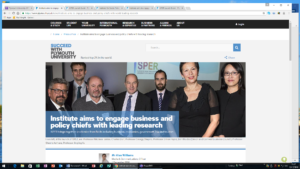
ISPER brings together academics from fields including business, economics, government, law and tourism
A research institute which will encourage business leaders and policy makers to use world-leading expertise to inform their decision making has been launched by the University of Plymouth.
The Institute of Social, Policy and Enterprise Research (ISPER), based within the University’s Faculty of Business, brings together academics from fields including business, criminology, economics, government, law and tourism.
Its aims will be to support academics to produce research of the highest quality, building on existing areas of excellence highlighted by the Research Excellence Framework in 2014, and assisting in the delivery of research-led teaching.
Through a range of public events and networking sessions, it will also attempt to foster academic collaborations both within the University and externally, and encourage academics to engage directly with policy makers, businesses, charities, NGOs and other key influencers.
Professor Jingjing Xu, Associate Dean (Research) in the Faculty of Business and ISPER’s Director, said:
“We live in a time of international upheaval, where the world is facing challenges ranging from economic uncertainty to conflict and climate change. And what is becoming evident is that academic expertise can increasingly be used to help policy makers tackle some of those problems. ISPER can facilitate the conversations and collaborations through which our academics can pursue high quality research and then engage with, and influence, decisions made at a regional, national and international level.”
ISPER joins the University’s seven existing research institutes and it will share their core aims of encouraging collaborative research and promoting it to a wider audience.
At its public launch, ISPER’s initial research groups were revealed and they aim to build on previous research successes, including world-leading and internationally excellent areas highlighted by the Research Excellence Framework in 2014, as well as how it can look to increase impact and carry the University’s research reputation forward. They are:
- Crime, Justice and Society;
- Maritime Logistics, Business and Policy;
- Markets, Innovation and Competition;
- People, Organisations and Work;
- Product and Service Value Chain Innovation through Advanced Technologies;
- Responsible Entrepreneurship and Social Innovation.
Professor Nikolaos Tzokas, Dean of the Faculty of Business, said:
“We have always had outstanding academics within the Faculty conducting world-leading research. ISPER provides them with the coordinated support and encouragement to engage with a wider internal and external audience, enabling us to better celebrate our current successes and ensure there are plenty more in the future.”

 Copyright © 2026
Copyright © 2026